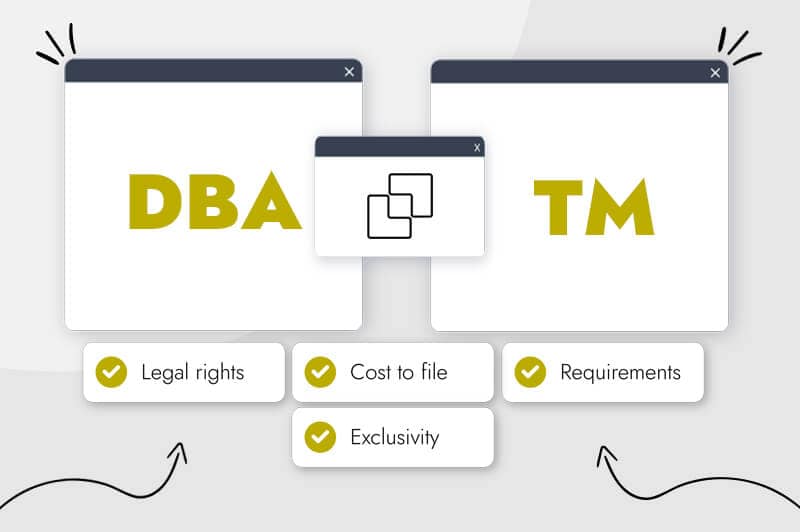You’ve got many decisions to make when starting a business, one of the most important being whether you should use a Doing Business As (DBA) or file a trademark.
Even though both can serve as your brand’s signature, there are key differences you need to know. For example, you use one to trade under an alias and the other to protect it. So, do you choose one or the other? Perhaps both!
Let’s find out by clarifying what’s the difference between a DBA and a trademark.
What is a Trademark?
A trademark’s purpose is to identify the source of goods or services and distinguish them from others within the same marketplace.
For example, Nike identifies its goods with their trademark swoosh and Converse by its 5-pointed star within a circle. Both are logos and trademarks.
When you register a trademark with the United States Patent and Trademark Office (USPTO), you legally own the design, known as intellectual property. No one else can use it without committing trademark infringement.
Anyone can register and own a trademark if it passes the USPTO’s strict trademarking laws.
Benefits of having a trademark
Consumers trust products and services with recognizable trademarks more than those without, many of which become part of our everyday lives.
Have you ever asked a shop assistant for cyanoacrylate when looking for super glue? Nope, me neither. That’s one benefit of having a trademark.
But there are other benefits, too. Let’s check them out:
1. Ensures brand protection: Another benefit of having a trademark is that no one else can use your designs to promote similar products or services.
2. Provides exclusive rights: A federal trademark protects your intellectual property, such as a business name or logo, throughout the U.S.
3. Bringing value to your business: A well-known trademark can be an enormous asset when selling franchises of your business.
4. Secures your business’s reputation: Your trademark represents who you are and what you stand for, increasing consumer trust in your products or services.
5. Use of the magic mark: The ® is a globally recognized symbol that adds validity to intellectual property and deters dodgy counterfeiters from using your logo or name.
6. The law protects you: You can sue anyone who uses your trademark, and the U.S. Customs and Border Protection can seize counterfeit imports.
What is a DBA?
A Doing Business As is a legal alias you can use for your business.
Sole proprietors often use an industry-relevant DBA instead of their name to ensure consumers understand their service. For example, Anna Wood, a plumber in Miami, could use “Bay Side Plumbing,” or Joe Mochi, a cleaner in New York, “Manhattan Maids.”
Using a DBA helps sole traders like Anna and Joe in several ways. They can choose a more professional-sounding name, use it to open a business bank account, and improve their local and online marketing SEO.
LLCs and corporations also use DBAs for branding and marketing when their entity name doesn’t suit their product or service. Take Space X—it sounds much cooler than “Space Exploration Technologies Corporation.”
However, not all U.S. states recognize a DBA as exclusive name ownership. Only legal entities have that privilege, so even if you have a DBA, someone else could register your name when forming an LLC or corporation.
You can secure your name nationally, protect it online, and claim ownership of your logo or slogan by registering a trademark application with the USPTO.
Benefits of having a DBA
The key benefit of having a DBA is you comply with the law without having to incorporate your business name as an LLC or corporation.
For example, let’s say Anna our plumber uses an alias but doesn’t register it as a DBA. Any contracts she signs using the name could become invalid.
Several other benefits of having a DBA:
1. Accessible to get: You can file a DBA in 3 easy steps. Simply choose your state, complete a DBA name search to ensure it’s available, and register your DBA with the state.
2. Low cost: The cost of filing a DBAranges from $5 to $150 depending on your state.
3. Avoids using your business name: You can use a market-relevant DBA instead of your legal business name for branding.
4. Provides privacy protection: A DBA helps protect the identity of sole proprietors and partnership owners who wish to keep their names off advertising materials.
5. Versatility: LLC owners expanding into other markets can use multiple DBAs instead of creating new entities, reducing costs and merging their tax obligations.
6. Business banking: Having a DBAenables you to set up a bank account in your business name, increasing your brand credibility with clients.
What’s the Difference Between a DBA and a Trademark?

Knowing the difference between a trademark and a DBA is crucial for protecting your business’s brand and reputation.
One key difference is that a DBA enables you to use a fictitious name for your business (any name other than your own or your business’s registered name), but provides little to no legal rights or protection. A trademark gives you exclusive rights to your business name, logo, slogan, or any other intellectual property used to promote your brand.
The takeaway is that a trademark protects your name but it isn’t how you register it; you’ll either have to form a business entity like an LLC or register a DBA.
Some other differences you should know are:
- Requirements: The requirements for filing a trademark outweigh those for registering a DBA
- Cost to file: A trademark costs around $350 to file, while you can register a DBA for as little as $5 depending on your state
- Exclusivity: A trademark gives you exclusive use of your name/logo; a DBA does not
Do DBAs need a trademark?
A DBA needs a trademark to stop others from using it and to ensure you don’t unintentionally copy a registered trademark.
Can you trademark a DBA name?
Yes, if you use your DBA as your brand name, you can apply to register it to gain intellectual protection.
To register a trademark, you must satisfy the USPTO that your DBA is unique, choose the right trademark class, and convince them you’ll use it to distinguish your products or service from competitors in your marketplace.
Conclusion
Now you know the difference between a DBA and a trademark, your next step is to choose the one that suits your situation. That could be DBA for your business name.
The point is a DBA might suit the now, but a trademark could secure your business’s future.
